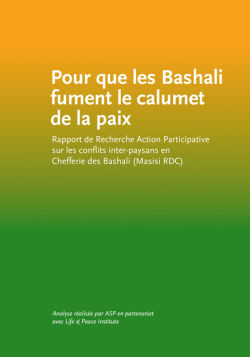Publications & reports
Pour que les Bashali fument le calumet de la paix
Rapport de Recherche Action Participative sur les conflits inter-paysans liés à la gestion des terres rurales en Chefferie des Bashali, dans le Territoire de Masisi (RDC), 2010–2014
Cette étude, menée à Masisi (Nord-Kivu), se situe dans le cadre du projet ‘Terre-Pouvoir-Identité’ reliant les conflits fonciers aux dynamiques socio-économiques, juridiques et politiques. L’hypothèse est que dans le contexte des droits fonciers précaires, les conflits fonciers de tous les jours contribuent à une perception négative entre les communaut�és.

- Date
- Type
- Report
The report is the result of several years of research led by Action Solidaire pour la Paix (ASP), with financial and technical support of the Life & Peace Institute (LPI).
Summary
The Masisi territory in North Kivu has been one of the epicentres of conflict in Eastern DRC. Most recently in 2012 and 2013, the M23 rebellion has made the headlines of international media. Largely escaping international attention, local conflicts continue in the Chefferie de Bashali, to the West of North Kivu’s capital Goma. The conflicts emerge in the context of the triangle of land, power and identity, described in previous reports in the Life & Peace Institute’s Great Lakes
Series and other DRC analysts as central to making sense of conflict and promoting peacebuilding in Eastern DRC. Many conflicts thus take an inter-community expression and evolve around issues relating to land access. In Bashali, a variety of actors with different interests related to land access interact in the production and reproduction of conflict.
The present report is the result of several years of research led by Action Solidaire pour la Paix (ASP), with financial and technical support of the Life & Peace Institute (LPI). It is an example of Participatory Action Research (PAR), a long-term inquiry process, where all parties involved in a destructive or intractable conflict are engaged in a process of analysing the multiplicity of interpretations of conflict causes and consequences and the identification of constructive actions for the future. Following an initial context analysis in 2008/09, which helped to focus the research questions, the research process from May 2010 to July 2013 combined classical field research (interviews, focus group discussions, document review and observation) with several participation mechanisms. Over the course of the process, for instance, 14 restitution workshops with representatives of farmers and herders, local authorities, civil society representatives and local deputies, among others, were conducted. These had the objective to share and discuss intermediary research results, enrich them, gather the reactions of the actors to those reports, and, as the process evolved, to sensitively prepare inter-community dialogue, which finally took place in August 2013. In total, 1,832 persons were involved in the data gathering and interpretation process.
The present report provides an in-depth analysis of land conflict in the Chefferie de Bashali. Following the description of the methodology of the PAR, the second part of the report describes the contextual factors that have influenced the reproduction of land conflict between farmers and livestock herders and inter-community relations. Those include the historical development of the region, including waves of migration and the increase in pressure on available fertile land over the decades. The chapter also describes the evolution of the land regime, with traditional and modern land management systems coming into interplay. In chapter three, the report is zooming in to the conflict between farmers and livestock herders and presents its current form. This is the heart of the research report. Finally, in chapter four, the report analyses existing peacebuilding efforts in the area.
This report marks a critical step in ASP’s and LPI’s efforts for transforming conflict in the Masisi territory. It concludes the first phase of the process and gives way to more engagement, following an Action Plan for Conflict Transformation developed by community representatives during the Inter-community Dialogue, held in Goma in August 2013.
This publication is the accomplishment of the communities of the Chefferie de Bashali that participated to the research process. It would not have been possible without the commitment of ASP, operating in volatile times in one of the most conflict-ridden regions of Eastern DRC. This report is dedicated to the local actors that continue the search for nonviolent solutions. In addition, LPI also hopes that external actors engaging in North Kivu will utilise the report in order to create joint paths towards long-term peacebuilding.
Finally, I would also like to express my appreciation for the work of LPI’s staff in the accompaniment of the research process and the preparation of the publication of this report.
Jenny Svanberg Programme Director, LPI